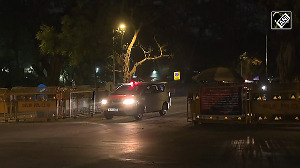When 191 members of the United Nations approve a blueprint for future global security, development and human rights on Tuesday, the document will most likely be a far cry from the original goals and ideals generally agreed upon by nations during the millennium summit in 2000.
On the eve of the UN World Summit, dubbed by Secretary General Kofi Annan as a 'once in a generation opportunity' to further the global cause for peace, security and development, there was no consensus on Monday night among members of the world body on issues like the setting up of a permanent monitor for human rights, religious violations and even on issues like peace building, something that the Millennium Summit had tentatively agreed upon.
"The negotiations are still on as of this evening as nations try to agree on the issues on board. Obviously, there will be some document ready tomorrow to be placed before the 166 heads of states and governments attending the summit this week beginning September 14, but there is no doubt that the draft document will not have all details and would be much less comprehensive than the original one," a diplomatic source told rediff.com.
Since the beginning of September, members of the UN have been holding intense, marathon negotiations, making last-ditch efforts to narrow differences in their positions on various issues like establishing a smaller group of nations to monitor human rights all year round, replacing the current Geneva-based Human Rights Commission as demanded by the western nations.
Other issues include protecting people of a nation in case of genocide and war crimes through intervention and non-proliferation because of concerns that terrorists might get hold of unconventional weapons.
While a compromise of sorts had been achieved on some of the eight Millennium Development Goals ahead of the summit that has been convened to discuss UN reform and the status of the MDGs, on vital issues such as setting up of human rights council, UN management reform and reform of the Security Council, convergence of opinions was yet to occur on Monday night.
The main reason was that countries, including the US and some members of the Non-Aligned Movement, were still fighting in their respective corners and refused to meet halfway, as Nicola Reindorp, head of Oxfam's New York Office said in a statement.
Countries like Egypt and Pakistan were believed to be acting as some sort of a spoiler to protect themselves against attack on their systems, particularly relating to human rights.
One source told rediff.com that these countries have become very negative even on issues like peace-building, the human rights council and the responsibility to protect. The United States, which has drawn flak from almost all UN members by opposing the use of the phrase of MDGs throughout the text of the document and by introducing over 400 amendments to a 39-page document, is believed to have come around.
John Bolton, the US permanent representative to the UN, was said to be proving a 'a bit difficult' on development issues and wanted much more on UN management reform in terms of giving more power to the secretary-general to manage and expand monitoring bodies. It is most likely, however, that Washington will have to settle for less in the compromise document that is expected to emerge on Tuesday.
This is because while the US and other western nations want to vest more power to the UN chief executive independent of the scrutiny of the General Assembly, developing countries see that as an erosion of the power the assembly. "The developing countries would like much more flexibility in the mandate to the secretary-general," one diplomat said.
India has been quite firm in the negotiations, on the issues of the power of the General Assembly vis-a-vis management reform and on responsibility to protect civilians in genocide, crimes against humanity, ethnic cleansing and war crimes when the government of the people concerned are unwilling or unable to do so.
Also, on the issue of nations meeting the goal of contributing 0.7 percent of their gross national product in foreign aid, the US was believed to be unwilling. The question of the UN Security Council Reform, an issue dear to India, is not expected to be taken up during the summit but after it.
Although NAM has faced criticism from certain quarters for allegedly trying to stall reform, the grouping has taken positions on some of the issues, though not all. But the problem is that it has not been able to speak in a unified voice, with certain member countries, including Pakistan and Egypt, making statements opposed to the grouping's stand and position.
With consensus on the document yet to emerge a day before the summit, Secretary-General Kofi Annan voiced his concern on Monday. Cancelling a scheduled press conference, he intensified diplomatic efforts to secure a 'give and take' from member states.
"There is clearly a sense of urgency, the clock continues to tick, the negotiators, I think, have left things perilously late in the light of the date of the summit, which was announced well in advance and Annan is concerned the work might not be done," spokesman Stephane Dujarric told reporters. But he said that Annan was not going to give up and he would continue to consult with member states at various levels.
Most agreed that the final document to emerge by Wednesday would likely be watered down, but they still hoped that some kind of roadmap for the future will come out.
"There are always conflicts of interests among nations, especially for those countries who primarily are interested in safeguarding themselves against questions or issues asked by other member states, but the final document may not be a complete damage," one official said. "There might be a minimum substance in the document, not as much as has been expected, but still there will be a document agreed upon by the member states."
Said author Shashi Tharoor, an UN under-secretary general, in a column published on Monday in TomPaine.com -"This week's summit will be the single largest gathering of world leaders in human history. If world leaders rise to their responsibilities, the rebirth and renewal of the UN will be at hand. With its renewal, we will also renew our hope for a fairer and safer world."







 © 2025
© 2025